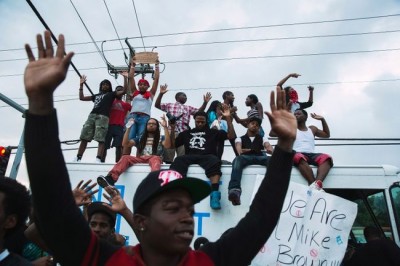Police State USA: Ferguson Demands Justice Despite Repression, Criminalization
Civil disobedience results in the arrests of 35 people

On Sept. 10 the people of Ferguson, MO and others demanding the indictment and arrest of white police officer Darren Wilson in the shooting death of 18-year-old Michael Brown attempted to block the traffic on Interstate 70.
Police were present in large numbers in an effort to prevent the protest from having the desired impact. Despite the heavy law-enforcement mobilization traffic was still tied up for several hours.
The demonstration illustrated the ongoing discontent of the African American community in this suburb outside of St. Louis which last month witnessed the most significant urban rebellion in several years in the United States. When the youth in Ferguson rose up in mass demonstrations and unrest, it struck a chord among African Americans and other oppressed communities across the U.S.
With specific reference to the Sept. 10 civil disobedience, it was reported by RT that “The protest started at 3 p.m. Central time, with people gathering at the Hanley Road interchange. Police lined the overpass and stood along the street, then surrounded the demonstrators.” (Sept. 10)
“Police on Hanley seem ready for lots of arrest with Department of Corrections bus,” St. Louis Post-Dispatch staff photographer David Carson wrote on Twitter during the initial stages of the action. Another journalist from the Riverfront Times Danny Wicentowski wrote on twitter that there was a massive reserve force, including over 20 police cars, near the staging area. (Sept. 10)
In an article published by the Blaze on the Sept. 10 demonstration it notes that, “The community appears to be growing impatient as Ferguson officer Darren Wilson waits to find out whether or not he will be indicted by a grand jury in Brown’s death. Some in the community are vowing only a conviction will satisfy protesters. (theblaze.com)
“If (Darren Wilson) doesn’t get a guilty conviction, this whole nation is going to riot.” St. Louis resident Whitman Harris told the St. Louis Post-Dispatch.
Just the day before the first Ferguson City Council meeting was held since the Aug. 9 shooting death of Brown. The turnout for the meeting was so large that it was moved from City Hall to Greater Grace Church in order to accommodate the audience over 600 people.
Residents expressed their outrage over the failure of the St. Louis County grand jury investigating the killing to deliver an indictment against Officer Wilson. Security guards were used to restrain some speakers who were unsatisfied with the responses given by the officials.
At one point Mayor James Knowles III stated that the City Council would only listen to comments from the public. People began to yell “shut it down” meaning the legislative body.
Criminalization of the People Further Exposed
A series of criminal justice reforms were read into the record at the City Council meeting illustrating the overall criminalization of the majority African American community in Ferguson. It was revealed that some 12,000 people out of a total population of 21,000 were subjected to arrests by local authorities.
Such a large-scale rate of arrest warrants being issued to Ferguson residents sheds light on the efforts to criminalize Brown in the aftermath of his death. Mass demonstrations in opposition to Brown’s killing and the demand for justice were also immediately portrayed as unlawful acts prompting the militarization of the police and the utilization of high-powered rifles, teargas, pepper spray, bean bags and rubber bullets.
The St. Louis Today in an article on the meeting reported that “The overhaul to the municipal court system includes reducing revenue from fines and reforming procedures. Court fine revenue would have to stay at or below 15 percent of the city’s total revenue and any court revenue over that amount be used for special community projects instead of general revenue uses.” (Sept. 9)
Hundreds came to the Ferguson police clerk’s office during the week in order to test the reforms. Those facing imminent arrest were ostensibly given 30 days to make arrangements to pay outstanding fines that could land them in jail.
According to the New York Times, participants “looked around skeptically.” Quoting Katrina Clemons, who owed nearly $800 in fines and penalties from an original $250 traffic ticket, “I don’t know if they are going to lock me up.” (Sept. 12)
During 2013 Ferguson issued over 25,000 arrest warrants averaging about three per household. A review by a non-profit organization operating in the area, the Arch Defenders League, revealed that about half the courtrooms in the city of Ferguson and surrounding areas frequently commit blatant violations of constitutional guarantees leaving residents subjected to detention, job losses and evictions.
A review conducted by the New York Times reports:
“Data from municipal courts across Missouri show that in 2013, the city of Ferguson had the highest number of warrants issued in the state relative to its size. Arrest warrants are often served by municipal courts when someone fails to appear in court to pay fines for traffic or other violations, like shoplifting, assault or disturbance of peace.” (Sept. 12)
Consequently, with such a criminal justice collection and incarceration policy as it exists in Ferguson and surrounding cities, the only real solution must go beyond mere reform but involve a general amnesty for those facing fines and jail sentences for these alleged offenses. Such a gesture by the municipal courts would provide a mechanism for some normalization of relations between the police, the prosecutors and the judicial system on the one hand and the people on the other.
This amnesty and the immediate indictment and arrest of policeman Darren Wilson would go a long ways in meeting a section of the demands being put forward by the people in Ferguson. Additional programs aimed at job creation and educational opportunities would address the gross economic underdevelopment so prevalent in the region.

